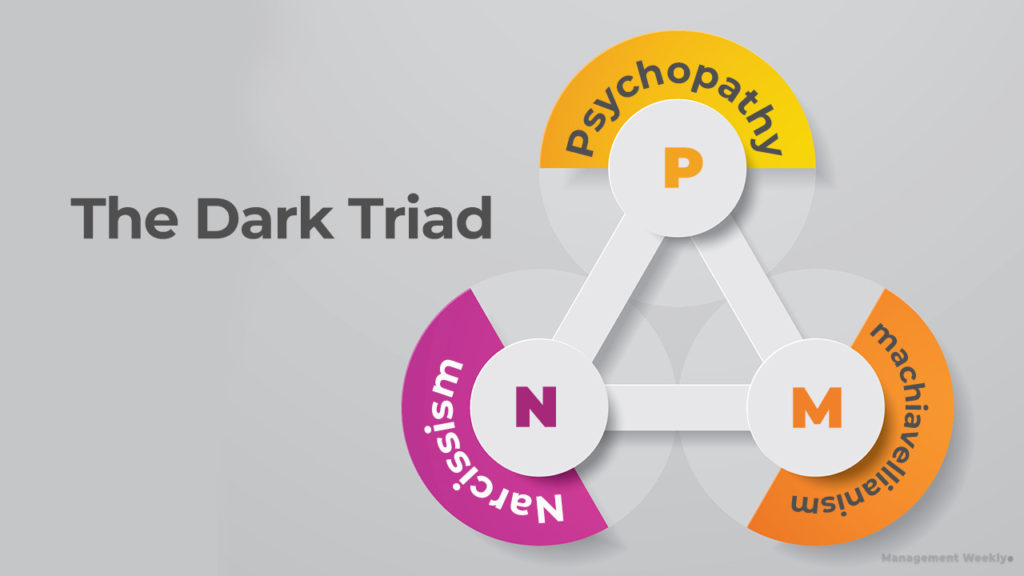Personality refers to the aggregation of several traits that account for a person’s behavior most of the time. Such traits are likely to remain stable over time. The most common personality traits that you have heard of are introversion, extraversion, openness, positive affect and so one. However, there are several personality traits that explain why people behave with negative intent. These personality traits are collectively called dark personality triad.
Living with someone whose prominent predisposition is dark may be challenging. This is specially so when they are in your immediate family or in your workplace. Imagine having a boss who abuses you for no good reason or a co-worker who keeps on spreading rumors about your personal life. In this article, we will explore the dark traits and how you can navigate your way past them in the workplace.
The dark triad personality was first mentioned by Delroy Paulhus and Kevin Williams in 2002. It consists of three traits:
- Narcissism
- Psychopathy
- Machiavellianism

Narcissism
Narcissism is a personality trait where the individual has an elevated sense of self-importance. They are likely to be overly obsessed with themselves and think that they are the best. Highly narcissistic people love to attract attention and admiration. This is because they are in love with themselves. While some degree of self-love is desirable and has positive impacts on personal development, narcissistic people are often consumed by self-love. Their sole purpose in life is to establish their self-importance.
A narcissist can easily be identified. They have the following characteristics:
- An elevated sense of self-importance and grandiosity
- A sense of entitlement and a need for admiration and attention.
- Superiority complex
- Exaggeration of achievements
- Blaming and shaming other people
- Spending a lot on acquiring expensive items, like clothes and cars
- Envy
- Monopolizing conversations
Narcissistic individuals often feel that others love and admire them. However, that is not true in most cases. People are likely to see through their facade. Their friends and co-workers perceive them to be excessively selfish and manipulative. As a result, they do not enjoy a satisfactory social life. They tend to hop through social groups in order to receive admiration.
How to deal with narcissism in the workplace?
Working with a narcissist can be very distressing as they completely lack emotional intelligence. Always remember that having a logical conversation with such people will not improve your situation. Contrarily, it can worsen the situation. Firstly, you need to identify whether the person is narcissistic or just an extrovert. Once you are sure that your co-worker or boss is a narcissist, you need to accept the situation and your feelings of frustration, sadness and anger.
Since there is very little you can do to change their behavior, you need to focus on managing your emotions more. Try not to lose your sense of purpose. Do not let their words affect you too much. If they are in your team and you fear that they will take credit for all the work, you are partly mistaken. This is because other people can easily see through their narcissism, especially if they are working for a few months. You need to persistently present your work to your boss and others in the workplace and hope for the best.
If you feel excessively anxious, try mindfulness and other relaxation techniques. However, if you still feel stressed, you may talk about the issue with someone else in your workplace or family.
Psychopathy
Psychopathy is a condition where the individual is unable to experience empathy. Such individuals have a general coldness and flatness of affect. Unlike narcissists, psychopaths are difficult to identify. This is because they blend into the crowd very well and are extremely manipulative. However, deep down they lack conscience. Due to the lack of conscience, psychopaths tend to become criminals very often.
Some of the overt characteristics of psychopaths include:
- They tend to be extremely detached from their surrounding, including parents, spouse, and children.
- They are unable to show any empathy towards someone in distress.
- Psychopaths are unable to form long-lasting relationships.
- Such people do not take responsibility for their actions and do not feel guilt or remorse when they harm others.
- They tend to be sexually promiscuous from an early age.
- Psychopaths often commit crimes before they enter adulthood.
- They have a very short attention span and get bored very easily.
How to deal with a Psychopath in the workplace?
You may find it extremely tricky. This is because psychopaths have excellent people skills. They are very good at impression management. Overtly, you may get very few signs of psychopathy. They may appear helpful, proactive, charming and even trustworthy. This is because they are good at hiding crimes and lies. Since they tend to be pathological liars, they do not show any physiological signs of discomfort while lying or cheating.
The best way to handle the situation is to minimize your interactions with the psychopath. Do not trust them blindly. Always double-check the information they give you. It is best to not interact with them outside the workplace because you may never know what is in their mind.
Machiavellianism
The word is derived from the name of Niccolo Machiavelli, who was a Renaissance philosopher and writer. His famous book, “The Prince” depicted an ideal king as one who is harsh and punishes the subjects to achieve his glory. The book became very popular and the term Machiavellianism has been used to describe a manipulative and deceitful person ever since.
The common characteristics of Machiavellianism are as follows:
- They are excellent at reading social situations and other people. In other words, they have very high emotional intelligence.
- Such people are very manipulative and can sacrifice any personal relationship for power and money. They do not think twice before harming their own parents and children to achieve their personal goals.
- They tend to be pathological liars. This is because of a lack of remorse and guilt.
- Such individuals lack principles and values. They mold their values to fit the situation.
- They are unethical.
- Overtly. they may appear confident and charming and often use flattery to get their way.
- They are cynical and selfish.
Machiavellianism differs from psychopathy and narcissism because the former are able to read the minds of others. The latter two are often unable to decode a social situation and have no idea of what others are feeling or thinking.
How to deal with Machiavellianism in the workplace?
It is very important for such people to win. Hence when you are in a negotiation with them always propose a win-win deal. You need to be very cautious as they may try to manipulate you into a less favorable deal. In order to counter that, you must make a list of non-compressible issues. Do not give in at any cost. Finally, do not go to the negotiation table alone. Always take a co-worker with you.
If you have such people in your team, it is best to build a support sub-team. Although it will decrease team cohesion, it will help you work and maintain peace of mind. Do not interact with them outside work unless absolutely necessary.
Finally accept the fact that you cannot do anything that will change their behavior. However, you are responsible for your own sanity. Hence avoid them as much as possible. Do not try to confront them about their problem.
